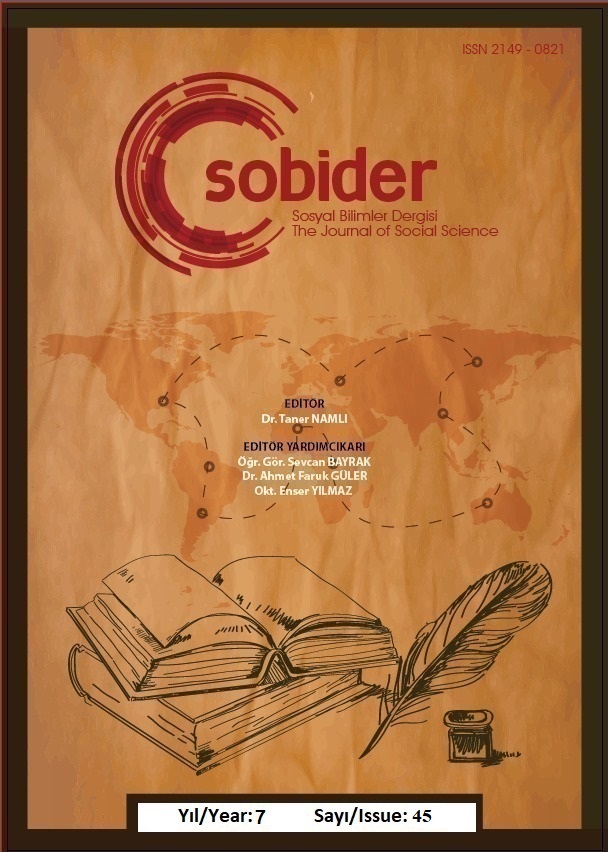KIBRIS BARIŞ HAREKÂTI ÖNCESİ TÜRK GAZETELERİNDEKİ KIBRIS KONULU KARİKATÜRLERİN POPÜLER JEOPOLİTİK BAĞLAMINDA ANALİZİ
Author :
Abstract
İktidarlar söylemlerini meşrulaştırıp, yaygınlaşmasını sağlamak için çeşitli yöntemler kullanırlar. Bu yöntemlerden birisi de popüler kültürün bir araç olarak kullanılmasıdır. Kitle iletişim araçlarının toplumları etkileme ve yönlendirme gücünden yararlanan iktidarlar bu araçlardaki haber, köşe yazısı, ilan gibi alanlarda söylemlerini halka iletir ve haktan destek talep ederler. Fakat bu yöntemlerle yapılan aktarımlarla ikna etmek bazen zorluklar çıkarır. Oysa doğrudan mesaj iletmeyen öğeler ile aktarılan mesajlara karşı direnç daha düşük olur ve istemsiz de olsa o fikir bilinçaltına yerleşir. Bu yöntemlerden birisi de karikatür kullanmaktır. Karikatürler insanları güldüren, hoşça vakit geçirmesini sağlayan görsellerdir. Karikatür ile bireye aktarılan mesaj karikatürün görsel gücü altında ikinci planda kalsa da mesajın açık algıya ulaşmasını rahatlatır. Kıbrıs Barış Harekâtının hazırlık evresinde Türk gazeteleri de karikatürün görsel gücünden faydalanarak çeşitli iktidar söylemlerinin halka ulaşmasında karikatürleri araç olarak kullanmıştır. Bu çalışma, Kıbrıs Barış Harekâtı öncesindeki beş günlük sürede seçili gazetelerde yayımlanan karikatürlerin eleştirel jeopolitik bakımdan analizini amaçlamaktadır.
Keywords
Abstract
Governments use various methods to legitimize and spread their discourses. One of these methods is the use of popular culture as a tool. The governments benefit from the power of mass media to influence and direct societies, they communicate their discourse to the public and demand support from the public using tools such as news, opinion column and advertisements. But persuasion through these methods sometimes present difficulties. However, resistance to messages transmitted by elements that do not transmit direct messages is lower, that idea settles involuntarily into the subconscious mind. Another method is the use of cartoons. Cartoons are visuals that make people laugh and enjoy themselves. Even though the message conveyed to the individual with the cartoon remains the secondary plan under the visual power of the cartoon, it makes it easier for the message to reach a clear perception. During the preparatory phase of the Cyprus Peace Operation, Turkish newspapers also used cartoons as tools to reach the public with various government discourses by making use of the visual power of cartoon. This study aims to analyze the critical geopolitical aspects of the cartoons published in selected newspapers during the five-day period prior to the Cyprus Peace Operation.
Keywords
- Çetin, B. N. (2016), "Küresel Şirketlerin Jeopolitik Etkisi", Sosyoloji Araştırmaları Dergisi, 19 (1), ss.34-73.
- Dittmer, J. (2010) Popular Culture, Geopolitics, and Identity, Rowman&LittelfieldPublishers, Maryland.
- Dittmer, J. ve DODDS, K. (2008) “Popular GeopoliticsPastandFuture: Fandom, İdentitiesandAudience”, Geopolitics, 13:3, ss. 437-457.
- Dodds, K. (2010), "Popular Geopolitics and Cartoons: Representing Power Relations, repitition and Resistance", Critical African Studies, 2: 4, ss.113-131
- Dodds, K (2007) Geopolitics, Oxford UniversityPress, New York NY.
- Dodds, K. (2000) Geopolitics in a Changing World, PearsonEducation Limited.
- Greenberg, J. (2002). Framing and Temporality in Political Cartoons: A Critical Analysis of Visual News Discourse. Canadian Review of Sociology/Revue canadienne de sociologie, 39(2), ss.181-198.
- Hammett, D. (2010). Political cartoons, post-colonialism and critical African studies. Critical African Studies, 2(4), ss.1-26.
- Hughes, R. (2007) “Through theLookingBlast: Geopoliticsand Visual Culture”, GeographyCompass, 1/5, ss. 976-994.
- Ó Tuathail, G. (1998) Postmodern Geopolitics, In: (Eds. Ó Tuathail, G. andDalby, S.), RethinkingGeopolitics, Routledge, London, ss. 16-38.
- Ó Tuathail, G. (2000) Dis/Placingthe Geopolitics Which Cannot not Want, PoliticalGeography, 19 (3), ss. 385-396.
- Ó Tuathail, G. (2005) Geopolitics, In: (Eds. Atkinson, D. et all), Cultural Geography: A Critical Dictionary of KeyConcepts, I.B. Tauris, London, ss: 65-71.
- Şener, B. (2017), Jeopolitik Uluslararası İlişkilerde İnsan, Devlet, Coğrafya ve Zaman Etkileşimi Üzerine Bir Giriş, Barış Kitap, Ankara.
- Yanık, L. K. (2015), "Türkiye’ye Popüler Jeopolitikle Bakmak: Çarpışan Mekanlar, Değişen Simgeler, Çatışan Kimlikler", Türkiye Dünyanın Neresinde, (Edt: Yeşiltaş M. Durgun S. Bilgin P.), Koç Üniversitesi Yayınları, İstanbul, ss.155-178.





